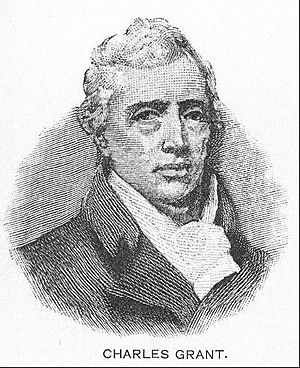Charles Grant (British East India Company) facts for kids
Charles Grant (born April 16, 1746 – died October 31, 1823) was an important British politician. He played a big role in both Indian and British affairs. Charles Grant was a strong Christian who believed in helping society and spreading Christian ideas, especially in India.
He was the Chairman of the British East India Company. He also served as a member of Parliament (MP). Grant was a very active member of a group called the Clapham Sect. This group worked hard to end slavery. Henry Thornton, who started the Clapham Sect, considered Grant a close friend. Grant even helped build a house for himself near Thornton's estate in Battersea. He later moved to Russell Square in London.
Life Story
Charles Grant was born in Aldourie, Scotland, on April 16, 1746. This was the same day his father fought in the Battle of Culloden. His father was badly hurt but survived. He later joined a Scottish regiment and died in Havana in 1762. Charles Grant's mother was Margaret MacBean.
Many Scots like Charles Grant found success working for the British Empire. In 1767, Grant went to India to join the military. Over the years, he moved up in the British East India Company. First, he managed trade in Bengal. Then, in 1787, he became a member of the Company's board of trade. He had made a lot of money from making silk in Malda.
At first, Grant lived a very lavish life. But after losing two of his children to smallpox, he had a major change in his religious beliefs. This new Christian faith guided his life and career from then on.
Grant returned to Britain in 1790. In 1802, he was elected to Parliament for Inverness-shire. He was an MP until 1818, when he retired due to poor health. His connection with the East India Company continued. In 1804, he joined the Company's Court of Directors. In 1805, he became its chairman. He passed away on October 31, 1823, at his home in Russell Square, London, at age 77.
His oldest son, Charles, was born in India. He also became a politician and later a British noble. His other son, Robert, worked for the Indian service. He became the Governor of Bombay and also wrote Christian hymns.
Work in India
Charles Grant became a strong Christian around 1776. This was eight years after he first went to India. As a trade manager in Malda, he saw local people suffering from famine and floods. He felt great sympathy for them. He believed that introducing Christian teachings would help improve society in India.
In 1786, he and a chaplain named David Brown wrote a plan. It was called Proposal for Establishing a Protestant Mission in Bengal. The Company didn't take it seriously at first. But Grant sent a copy to Charles Simeon, a religious leader in Cambridge. Simeon then found Christian chaplains to go to India. British politician William Wilberforce also supported this idea.
Before the Company's charter was renewed in 1793, Grant wrote a longer paper. It was titled Observations on the State of Society among the Asiatic Subjects of Great Britain particular with respect to Morals; and on the means of improving it (1792). In this paper, he argued that India could improve socially and morally. He thought the Company should allow Christian missionaries into India. This was very different from the Company's usual view. The Company had always believed that missionary work would hurt its business. Grant also suggested that the Indian caste system was unfair. He argued that the Company should support Christian missionaries to help the situation. The paper also suggested other ways to help Indians. These included teaching English and using machines in farming.
Grant and Wilberforce pushed for a "Pious Clause" in the Company's 1793 charter. This clause would let the Company hire teachers and missionaries to spread Christian ideas in India. In 1797, Grant showed his essay to the Company's Directors. The Directors were against the idea. They called sending missionaries to India "the wildest, maddest... plan." However, Wilberforce and his friends worked hard. They succeeded in getting their ideas included in the next charter renewal in 1813. The "Pious Clause" in the 1813 charter didn't specifically mention missionaries. But the Company did agree to support the Anglican Bishop of Calcutta and three archdeacons.
As Chairman of the Company, Grant helped many chaplains go to India. These included Claudius Buchanan and Henry Martyn.
Grant was also largely responsible for starting the East India Company College. This college was built at Haileybury.
Christian Humanitarian Work
Charles Grant was part of a group of Christian friends. They were all part of an Anglican movement. Famous members included William Wilberforce, who fought to end slavery, Zachary Macaulay, John Venn, Henry Thornton, and John Shore. They lived near each other around Clapham Common in London. For some years, Grant lived in a large house called Glenelg near Wilberforce and Thornton.
This group, known as the 'Clapham Sect', combined their Christian beliefs with social reform. Both in India and in the British Parliament, Grant worked for education, social improvements, and Christian missions. In 1791, he helped create the Sierra Leone Company. This company offered a safe place for freed slaves. Also in 1791, he was elected to the London Abolition Committee. He strongly supported ending slavery everywhere. He was also a vice-president of the British and Foreign Bible Society from 1804. He also supported the Church Missionary Society and the Society for the Propagation of the Gospel.
See also
- Charles Grant - A ship that sailed for the East India Company between 1810 and 1833
 | Sharif Bey |
 | Hale Woodruff |
 | Richmond Barthé |
 | Purvis Young |


